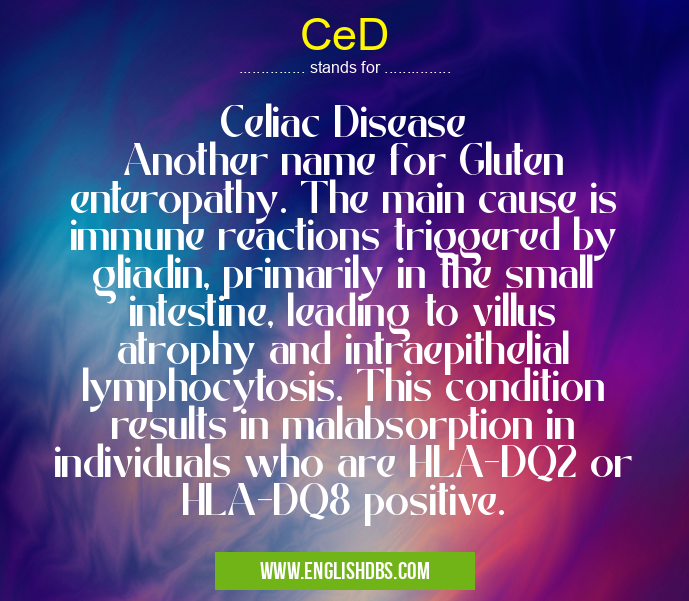What does CED mean in CLINICAL MEDICINE
Celiac Disease, or CeD, is an autoimmune disorder commonly caused by a reaction to gliadin, a protein found in wheat. While it can affect people of all ages, it is most common among children and young adults. CeD affects only individuals with specific genetic determinants (HLA DQ2 or HLA DQ8). This condition leads to villus atrophy and intraepithelial lymphocytosis in the small intestine, causing malabsorption of nutrients.

CeD meaning in Clinical Medicine in Medical
CeD mostly used in an acronym Clinical Medicine in Category Medical that means Celiac Disease Another name for Gluten enteropathy. The main cause is immune reactions triggered by gliadin, primarily in the small intestine, leading to villus atrophy and intraepithelial lymphocytosis. This condition results in malabsorption in individuals who are HLA-DQ2 or HLA-DQ8 positive.
Shorthand: CeD,
Full Form: Celiac Disease
Another name for Gluten enteropathy. The main cause is immune reactions triggered by gliadin, primarily in the small intestine, leading to villus atrophy and intraepithelial lymphocytosis. This condition results in malabsorption in individuals who are HLA-DQ2 or HLA-DQ8 positive.
For more information of "Celiac Disease Another name for Gluten enteropathy. The main cause is immune reactions triggered by gliadin, primarily in the small intestine, leading to villus atrophy and intraepithelial lymphocytosis. This condition results in malabsorption in individuals who are HLA-DQ2 or HLA-DQ8 positive.", see the section below.
Essential Questions and Answers on Celiac Disease Another name for Gluten enteropathy. The main cause is immune reactions triggered by gliadin, primarily in the small intestine, leading to villus atrophy and intraepithelial lymphocytosis. This condition results in malabsorption in individuals who are HLA-DQ2 or HLA-DQ8 positive. in "MEDICAL»CLINICAL"
What is Celiac Disease?
Celiac Disease (CeD) is an autoimmune disorder caused by a reaction to gliadin, a protein found in wheat that primarily affects those with certain genetic determinants. CeD results in villus atrophy and intraepithelial lymphocytosis within the small intestine, leading to malabsorption of essential nutrients.
How does one know if they are at risk for developing CeD?
Those who have been diagnosed with type 1 diabetes mellitus or other autoimmune diseases such as Hashimoto's thyroiditis are at greater risk for developing Celiac Disease. Additionally, individuals who are carriers of the human leukocyte antigen (HLA) DQ2 or HLA DQ8 gene complex possess greater risk factors for developing CeD.
What steps can be taken to diagnose CeD?
A combination of blood tests, intestinal biopsy exams and imaging studies may be used to diagnose Celiac Disease. In addition, genetic testing may be necessary in some cases as well as endoscopy examinations to assess any damage done to the small intestine by the disease process.
What treatments exist for those with CeD?
Treatment for those affected by CeD involves following a strict gluten-free diet for life in order to avoid any further damage from occurring on the small intestinal lining due to gluten consumption. Patients may also require additional supplementation of vitamins and minerals due to nutrient malabsorption associated with CeD. Â In addition, other lifestyle modifications such as regular physical activity and stress management techniques may be beneficial toward managing symptoms related to this condition.
Final Words:
: In conclusion, Celiac Disease (CeD) is an autoimmune disorder which primarily affects individuals possessing certain genetic determinants and causes villus atrophy along with intraepithelial lymphocytosis within the small intestine leading to malabsorption of essential nutrients. Diagnosing this condition requires blood tests, intestinal biopsy exams and imaging studies while treatment mainly consists of following a strict gluten-free diet and making adequate lifestyle changes such as engaging in regular physical activity and stress management techniques may all help minimize symptoms associated with this disorder.
CeD also stands for: |
|
| All stands for CED |
